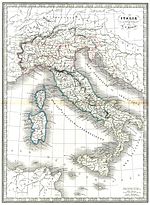
Back Mani pulite Afrikaans ماني بوليتي Arabic Чисти ръце Bulgarian Mani pulite Catalan Mani pulite Czech Mani pulite German Επιχείρηση καθαρά χέρια Greek Puraj manoj Esperanto Manos Limpias (Italia) Spanish Mani pulite Estonian
 Former prime minister Bettino Craxi greeted by a salvo of coins as a sign of loathing by protesters in Rome on 30 April 1993 | |
| Country | Italy |
|---|---|
| Started | 17 February 1992 |
| Judges |
|
| History of Italy |
|---|
 |
|
|
Mani pulite (Italian: [ˈmaːni puˈliːte]; lit. 'clean hands') was a nationwide judicial investigation into political corruption in Italy held in the early 1990s, resulting in the demise of the First Italian Republic and the disappearance of many political parties. Some politicians and industry leaders committed suicide after their crimes were exposed. Antonio Di Pietro was the main judicial figure in charge of the investigation. In some accounts, as many as 5,000 public figures fell under suspicion. At one point, more than half of the members of the Italian Parliament were under indictment, while more than 400 city and town councils were dissolved because of corruption charges. The estimated value of bribes paid annually in the 1980s by Italian and foreign companies bidding for large government contracts reached US$4 billion (6.5 trillion lire).
The corrupt system uncovered by the investigation was referred to as Tangentopoli (Italian pronunciation: [tandʒenˈtɔːpoli]). The term derives from Italian tangente, which means "kickback", and in this context refers to kickbacks given for public works contracts, and Greek polis meaning "city"; it is thus sometimes translated as "Bribesville" or "Kickback City".[nb 1] Former Italian prime minister Bettino Craxi became the main figure of the scandal and defended himself by saying that all parties did what he was accused of; Craxi, who fled to Hammamet, Tunisia, in 1994, was convicted twice for corruption and illicit financing to political parties and had four more trials pending by the time of his death in 2000. The Italian Communist Party (PCI) and some of its former members, mainly of its right wing, were also investigated but were acquitted.
The media impact and the climate of public indignation that followed were such as to decree the collapse of the then political system and the beginning of the Second Italian Republic, as historical parties, such as Christian Democracy (DC) and the Italian Socialist Party (PSI) dissolved, being replaced in Parliament in subsequent elections by newly formed parties, or those that had previously been in the minority or opposition, such as the Federation of the Greens (FdV) and Lega Nord (LN). Even without a formal change of regime, there was a profound change in the party system and a turnover of part of its national representatives. Eventually, all four parties in the 1992 government disappeared, at different times in different ways: the DC, the PSI, the Italian Democratic Socialist Party (PSDI), and the Italian Liberal Party (PLI). The Democratic Party of the Left (PDS), the Italian Republican Party (PRI), and the Italian Social Movement (MSI) were the only surviving national parties; the PRI is the only one that maintained its name since.
Cite error: There are <ref group=nb> tags on this page, but the references will not show without a {{reflist|group=nb}} template (see the help page).